24 Hours Hotline: +86 137-3541-1378
Email:[email protected]
24 Hours Hotline: +86 137-3541-1378
Email:[email protected]
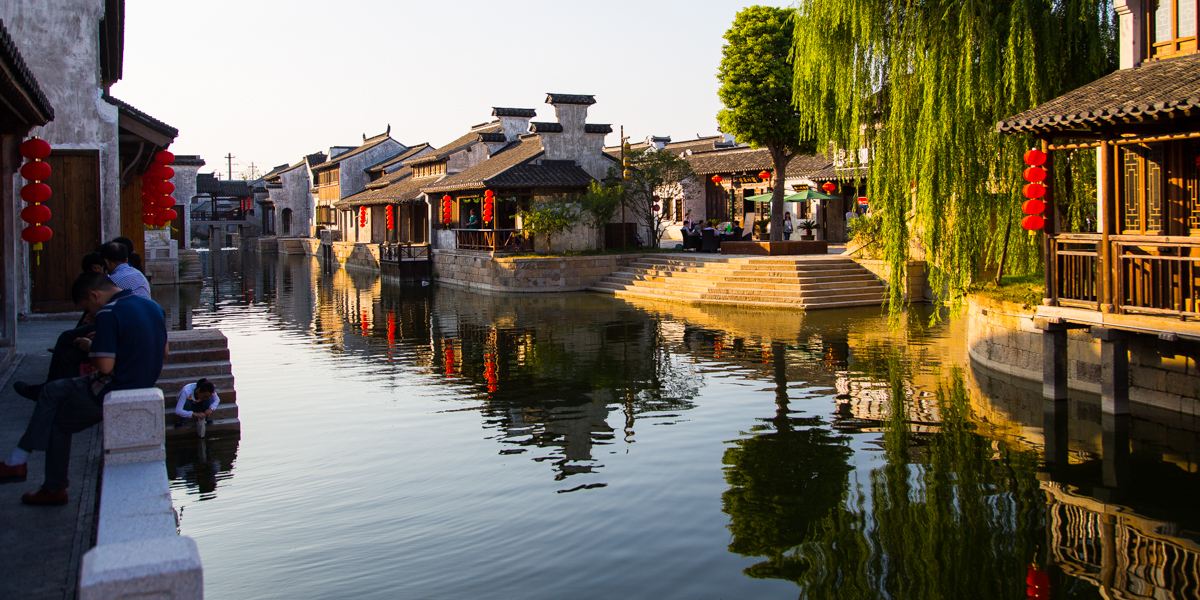
Dangkou Ancient Town, Wuxi Attraction
Brief Introduction
The Dangkou Ancient Town lies in the Erhu Town, southeast of Wuxi, neighboring aristocratic tombs of the Yue State at Hongshan and Taibo tomb in the west and bordering on Suzhou and Changshu in the east. Dongkou Ancient Town, known as Dingshe in ancient time, is said to be the hometown of a filial son named Ding Lan living in Eastern Han dynasty. Its name comes from its location at the mouth (kou in Chinese) of Er'zhen Shallow Lake (Er'in C zhen Dang hinese). It boasts of numerous historic relics including four (13 places) heritage sites under provinciao protection, one heritage sites under municipal protection, one controlled and protected and fifty historic buildings. In 2004, Dangkou was announced as a historic and cultural town in Jiangsu Province. In 2008, Dangkou Ancient Town was approved as one of the five important historic and cultural streets (famous towns) under the protection of Wuxi city.
What to See
The beautiful Erhu Lake nurtures the famous historic town. Most of the town residents are sharing the same family name of Hua. Their ancestor, Hua Zhengu comprehensively studied various schools of thoughts and exponents in China and wrote Lvde Ji (Collection of Thoughts) to hand down from generation to generation. Therefore, this region, which is endowed with rich natural resources and cultural heritage, not only brought forward men of talents, but also grew fast into the No.1 town in terms of grain tax payment in Jiangnan. Besides, with crisscrossing rivers and lakes, foot bridges and running streams, the town environment is quiet and tasteful. After several years of careful protective development according to the standards for national 4A level scenic spots, the historical and cultural district of Dangkou town is unveiled as a water town of Jiangnan for tourism and recreation.
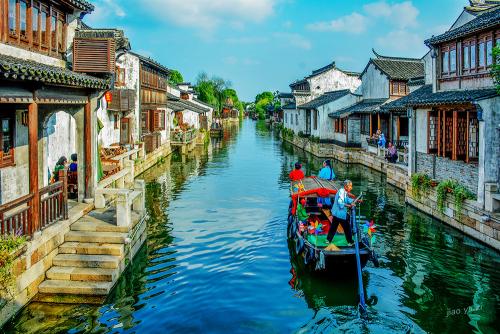
Legends and Stories
The Story of Mao Ci's Wall Gate
Long long ago there lived a rich couple in Dangkou. Their only regret was that the wife couldn't get pregnant after the marriage. They heard that Maoshan Taoist in Gourong would efficaciously grant whatever one requests so they decided to go to Maoshan Mountain for the birth of a son.
In less than a day, the couple arrived at Maoshan Mountain then religiously burned joss sticks and made kowtows to the Maoshan Taoist to ask for an heir of son. The Taoist said to them after counting on his fingers, “You are destined to have only a son who is not so good and will squander the family fortune. Do you want him or not?” The couple didn’t mind it as they believed their family property is more than enough for lavish spending. Therefore, they said, “Yes, we want this son.” Then they burned joss sticks again and donated money to the Taoist before returning home happily.
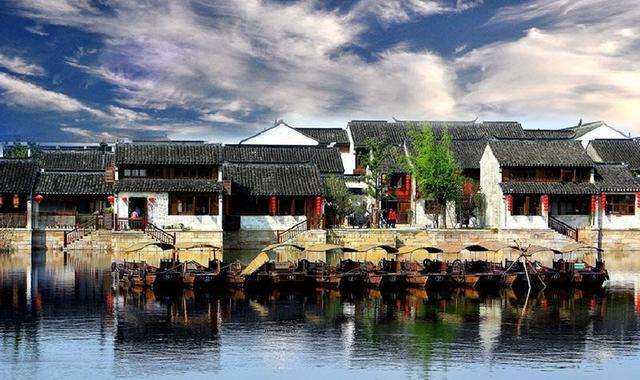
As a result, the wife was pregnant soon and gave birth to a plump boy after ten months. The boy was named Mao Ci since he was granted by Maoshan Taoist. Little Mao Ci was a cute, lovely and cheerful boy. As his parents grew old, he gradually began to take over family affairs. Born with a generous personality, Mao Ci did his best to help neighbors in case of emergencies and never hesitated a bit before offering material assistance to the poor countrymen. Therefore, he was popular with people in Dangkou.
The Story of Xiaozi Fish
Ezhen Shallow Lake has a vast area of water with rich aquatic products and various fishes. There is a strange fish with only half a body yet it swims freely in the water. More interesting, it was called Xiaozi Fish (Filial Son Fish). Legend has it that during the Warring States Period, a winter was so cold that the Ezhen Shallow Lake was frozen hard and many fishing boats were trapped in the lake by ice.
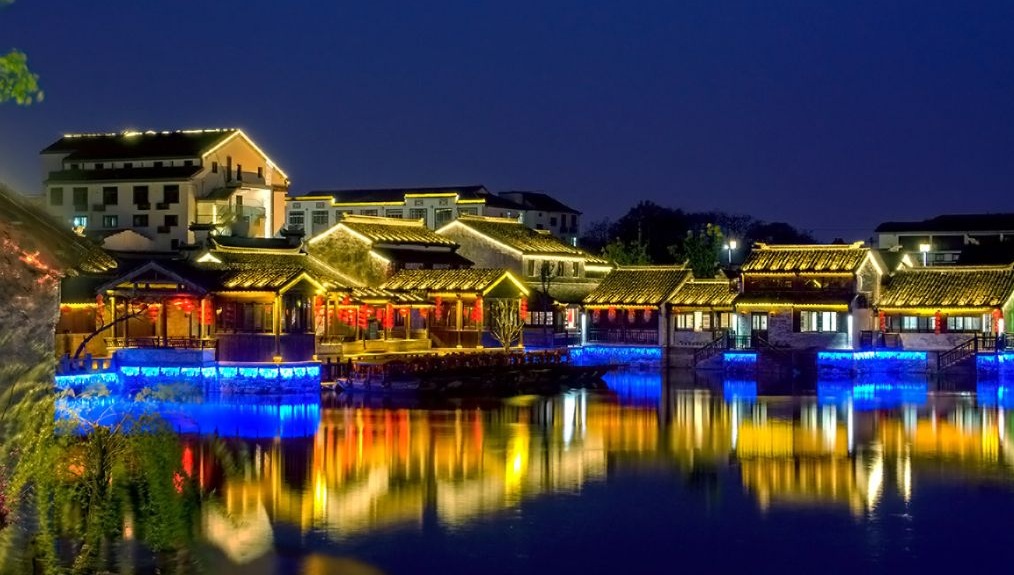
There lived a mother and a son on one boat. Due to continuous freezing days, the boat could not move a bit and the mother fell ill as she had nothing to eat in the cold weather. Besides, there was not a grain of rice on the boat. Seeing his mother grow weaker and weaker, the son was very worried and wanted to jump into the lake to catch a fish for his mother. But what could he do with such a bitter-cold weather and thick ice covering the lake? The son had no idea yet could not wait for his mother was so seriously ill. He gritted his teeth, took off clothes, broke open the ice and threw himself into the ice-cold Ehu Lake. Searching here and there, he finally caught a fish. Although frozen to shake all over, the son felt very glad. He climbed onto the boat and put on clothes, ready to make a bowl of delicious fish soup for his mother.
When he was about to kill the fish, tears welled off the fish’s eyes as if it was begging for release of its life. What should he do? The son looked to his sick mother then to the tearful fish and felt as if put on the thorns of a dilemma. If he released the fish back to the lake, it would be hard to face the needy mother, not to mention his suffering from the cold water; yet as for the choice of killing the poor fish, he simply couldn’t do so with a soft heart. He thought it over and over again and found a way out. "Yes", he said to himself, taking up the kitchen knife to half the fish, one piece with viscera and the other all flesh and bones. He put the half with viscera into the lake and said, "Good fish, you still have your viscera, go back to live in the water! I have borrowed half of your body to save my mother's life, please forgive me." Strangely, the half fish nodded its head as if it had a human mind and did not leave the boat for a long time. The young man was very happy and hurried to make soup for his mother with the other half of fish. His mother didn't feel hungry and gradually became better after having the fish soup. Both the son and the mother felt happy.
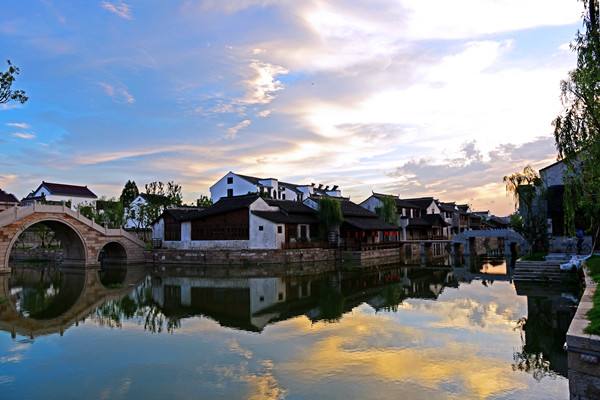
Culture of Dangkou
Managing the Family with Comity and Poems
Dangkou culture has a profound cultural foundation with a long history. In the third year of Hongwu Period in Ming Dynasty, Hua Zhengu, the ancestor of Hua family, first settled in Dangkou promoting the fast development of local economy. Hua Zhengu was appointed as Xiaolian Tongjing Rushi. He loved learning from childhood, read through all schools of thoughts, mastered the Buddhism, Taoism and Confucianism then developed unique family education theory and wrote Lvde Ji (Collection of Thoughts). Lvde was taken from a sentence in the Great Learning saying "that deliberation will be followed by the attainment of the desired end." Lvde Ji was regarded as a classic for managing the family by later generations and passed on among the offspring of Hua family to pave a foundation for the long term development of the Hua family.
Dangkou, situated in Ehu, a blessed land, nurtured by the culture of poem and comity, becomes "a land of filial piety and charity" and "a cradle for celebrities".
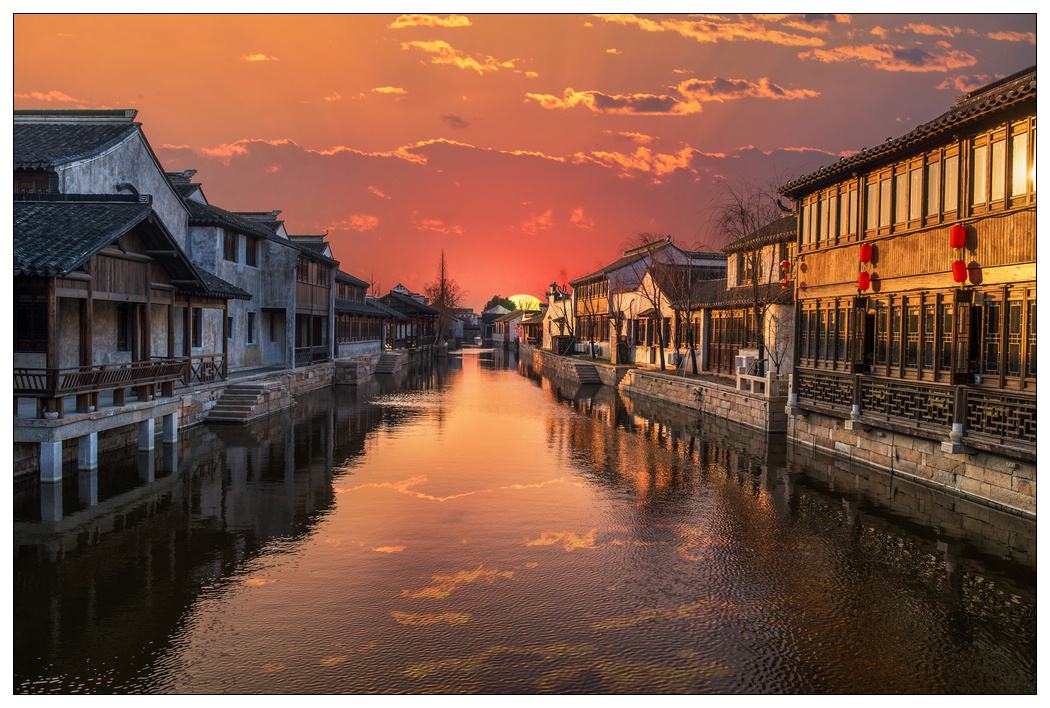
Travel Guide
Admission Fee: CNY 80
Opening Hours: 24 Hours
Recommended time for visit: 5-7 hours
Best season for travel: All year around
How to get to Dangkou Ancient Town
From Wuxi train station: take Bus No. 708 (7:08-19:08)
From Wuxi long-distance bus station: take Bus No. 711 (5:40-18:30)
Duration:6-8 hours
Attractions(Cities): Lingshan Grand Buddha, Yuantouzhu Park
Tour Style:Embark on a private day tour from Suzhou to Wuxi, where you’ll have the chance to visit two of the city’s most iconic attractions. Begin your day with a visit to the magnificent Lingshan Grand Buddha, one of the largest bronze Buddha statues in the world. Standing at 88 meters tall, it offers breathtaking views and a serene, spiritual atmosphere. Afterward, head to the nearby Yuantouzhu Park, a beautiful park located on the shores of Taihu Lake. Known for its scenic beauty, the park features lush gardens, traditional pavilions, and stunning lake views. You can also enjoy a leisurely boat ride on Taihu Lake to take in the surrounding natural beauty. This private tour, led by an experienced English-speaking guide, ensures a relaxed and informative experience with all transportation and logistics taken care of, giving you more time to immerse yourself in the sights and culture of Wuxi.
Duration:6-8 hours
Attractions(Cities):Three Kingdoms City, Yuantouzhu Park
Tour Style:Experience the best of Wuxi on this one-day private tour from Suzhou. Begin with a visit to Three Kingdoms City, a historical site where the epic tale of China’s Three Kingdoms comes to life through grand architecture and cinematic landscapes, many of which were featured in the filming of The Romance of the Three Kingdoms. As you explore, you’ll be immersed in replicas of ancient buildings, dramatic battle scenes, and breathtaking vistas that transport you to this legendary period in Chinese history. Afterward, head to Yuantouzhu Park (Turtle Head Park), known for its stunning views of Taihu Lake and its unique turtle-shaped peninsula. The park offers a peaceful retreat surrounded by lush greenery, historical landmarks, tranquil walking paths, and beautiful pavilions, providing a perfect setting to relax, enjoy nature, and take in picturesque views. This tour seamlessly blends Wuxi’s rich cultural heritage with its natural beauty, offering a diverse, enriching, and unforgettable experience that will leave you with lasting memories.
Duration:6-8 Hours
Attractions(Cities):Huishan Ancient Town, Boat Ride on Lake Tai, Turtle Head Park
Tour Style:Embark on a captivating One Day Private Wuxi Taihu Lake Sightseeing Tour, where you’ll experience the perfect blend of natural beauty and cultural heritage. Begin with a visit to Huishan Ancient Town, an enchanting area that showcases Wuxi’s traditional architecture, ancient temples, and local craftsmanship, including the famous Huishan Clay Figurines. Then, enjoy a relaxing boat ride on Taihu Lake, where you’ll be surrounded by stunning views of lush hills, tranquil waters, and picturesque islands, all while soaking in the serene ambiance. The tour culminates at Turtle Head Park (Yuantouzhu), a scenic gem named for its unique topography resembling a giant soft-shell turtle. Here, you’ll stroll along peaceful lakeside paths, visit beautiful pavilions, and admire the breathtaking natural landscape. With your expert guide offering insightful commentary throughout the day, this private tour ensures a rich and unforgettable experience of Wuxi’s most iconic attractions.
Duration:6-8 hours
Attractions(Cities):Nanchan Temple, Nanchang Street, Jichang Garden
Tour Style:This private Wuxi day tour is designed for those seeking a harmonious balance between cultural exploration and moments of peaceful reflection. The day begins with an immersion into Wuxi’s rich history, where you will visit ancient temples and explore charming historical streets that tell the story of the city’s vibrant past. As you stroll through these time-honored sites, you’ll encounter local customs and traditions that have shaped Wuxi over centuries, offering a fascinating glimpse into its heritage. The tour continues with a visit to one of the region’s most celebrated classical Chinese gardens, providing a serene escape from the city’s bustle. Here, you’ll have the chance to relax and enjoy the natural beauty, taking in the picturesque landscapes, tranquil ponds, and intricate architecture that are hallmarks of traditional Chinese garden design. This tour is perfect for those who want to delve into Wuxi’s cultural soul while also enjoying moments of calm and reflection amidst its peaceful surroundings. Whether you’re a history enthusiast or someone simply looking for a day of beauty and relaxation, this tour offers an enriching and unforgettable experience at a leisurely pace.
Duration:2 Days, 1 Night
Attractions(Cities):Turtle Head Island (Yuantouzhu Park), Lingshan Buddha, Three Kindoms City, HuiShan Ancient Town
Tour Style:Embark on a captivating journey through Wuxi with our Private Wuxi Tour Packages, designed to immerse you in the region's rich cultural heritage and stunning natural beauty. Your adventure begins with a visit to Turtle Head Island (Yuantouzhu Park), where you'll enjoy panoramic views of Taihu Lake, surrounded by lush landscapes and peaceful gardens that offer the perfect setting for relaxation. Next, marvel at the grandeur of the Lingshan Buddha, one of the world’s tallest statues, where spirituality and awe-inspiring architecture meet amidst serene surroundings. Continue your tour with the Three Kingdoms City, where history comes alive with interactive exhibits and ancient reenactments, transporting you back to the famed era of Chinese legends. Finally, explore the charming HuiShan Ancient Town, where the streets echo with centuries of history, offering a glimpse into traditional Wuxi life, culture, and heritage. With an expert guide accompanying you throughout the journey, you will gain fascinating insights into each destination's historical, cultural, and natural significance, ensuring a truly enriching experience.
Wechat: Chinaprivatetour
24 Hours Hotline:
+86 137-3541-1378
(Your Privacy is Protected)
1 to 1 tailor-made service from our professional travel advisors for the most sophisticated
Constantly excellent reviews for attraction, hotel and service Competitive price
Local experts provide quality tours Best selected knowledgeable local guides Authentic local restaurants
7*24 hours available to create you a worry-free tour. No Hidden Fees and absolutely no pressure to buy. Secured









Copyright © 2017 Suzhouprivatetour.com All rights reserved. 浙ICP备18056007号-4